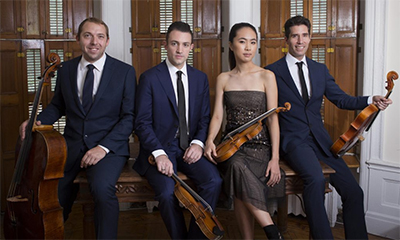by Mike Telin

On Thursday, March 28 at 7:30 pm in Akron’s E.J. Thomas Hall, the Escher — Adam Barnett-Hart and Danbi Um, violins, Pierre LaPointe, viola, and Brook Speltz, cello — will give the second performance of Rogerson’s new work. Presented by Tuesday Musical, the program will also include Mozart’s Quartet in F, K. 590 and Beethoven’s monumental Quartet in C-sharp, Op. 131. A conversation with the musicians led by composer James Wilding will begin at 6:30 pm. Tickets are available online.
“We all knew Chris,” first violinist Adam Barnett-Hart said by cellphone while enroute to the airport. “Brook and Danbi were at Curtis with him. He has a prolific output for someone still so young, and the fact that this is his fourth quartet is a monumental achievement for a composer of his age.”
Barnett-Hart said that they were surprised when they received the score, because they were expecting a much shorter piece. “When he delivered a 30-minute monster we were shocked, but it’s a piece we can really dig into, and play very romantically, which is great.”
Barnett-Hart said the first of its two movements is aptly titled “Fugue,” as its center is a fugue between all four instruments. “It’s intense and sort of dark. It’s contrapuntal and all the lines are at odds with each other.”
The violinist noted that the second movement is in sharp contrast to the first, and is inspired by the month Rogerson spent hiking through the countryside of Afghanistan and Pakistan.
“He musically describes the emptiness of the landscape — seeing no people, being isolated and forced to be alone with your thoughts. There’s a long repetitive line played by the second violin and viola. It probably repeats 50 times and it evokes stillness. He calls it meditations. The repetition forces the audience into a contemplative state, and I think that’s a beautiful thing.”
Barnett-Hart said the ensemble is excited to be able to play the piece again. “It’s a special piece and we’re happy to have it.”
Regarding the rest of the program, he said the quartets of Mozart and Beethoven are “two of the greatest masterpieces in the repertoire.”
Written in June of 1790, Mozart’s K. 590 is the third of the Prussian Quartets. “It’s an unusual piece in so many ways — more concise than a lot of his later quartets. It’s an impactful piece, and the last movement is really fun.”
Barnett-Hart described Beethoven’s Op. 131, a 40-minute work in 7 continuous movements, as a mountain of a piece that never stops. “It’s the summit of energy, effort, and struggle in the string quartet genre.”
Published on ClevelandClassical.com March 26, 2019.
Click here for a printable copy of this article


